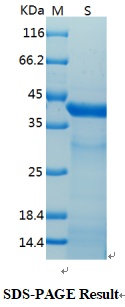Product Name :
CD13 Recombinant Protein Swiss-Prot :
P15144 Host :
E.coli Tag :
≥0.5mg/ml Amino acid Sequence :
NDLFSTSGNEWVLLNLNVTGYYRVNYDEENWRKIQTQLQRDHSAIPVINRAQIINDAFNLASAHKVPVTLALNNTLFLIEERQYMPWEAALSSLSYFKLMFDRSEVYGPMKNYLKKQVTPLFIHFRNNTNNWREIPENLMDQYSEVNAISTACSNGVPECEEMVSGLFKQWMENPNNNPIHPNLRSTVYCNAIAQGGEEEWDFAWEQFRNATLVNEADKLRAALACSKELWILNRYLSYTLNPDLIRKQDATSTIISITNNVIGQGLVWDFVQSNWKKLFNDYGGGSFSFSNLIQAVTRRFSTEYELQQLEQFKKDNEETGFGSGTRALEQALEKTKANIKWVKENKEVVLQWFTENSK Restriction sites :
NdeI-XhoI Background :
Aminopeptidase N (APN, CD13) is a widely expressed, membrane-bound proteolytic enzyme that breaks down peptides during digestion, cleaves cell surface antigens during antigen presentation, and acts as a receptor for human viruses, including several coronaviruses. This multifunctional protein is implicated in the regulation of many biological processes, including angiogenesis, cell proliferation, cell migration, inflammation and immune response. APN was originally identified as the cell surface antigen CD13, which is expressed in myeloid lineage hematopoietic cells and myeloid leukemia. Identified substrates of aminopeptidase N include the angiotensin I-III peptide hormones, the opioid peptide met-enkephalin, and cytokines MCP-1 and MIP-1. Abnormal APN protein expression is seen in various forms of cancer, with high APN expression associated with poor survival in colon cancer and non-small cell lung cancer and silenced APN expression related to poor prognosis in prostate cancer. Soluble :
PBS, 4M Urea, PH7.4 Purification&Purity :
Transferred into competent cells and the supernatant was purified by NI column affinity chromatography and the purity is > 85% (by SDS-PAGE). Storage&Stability :
Store at 4°C short term. Aliquot and store at -22°C long term. Avoid freeze-thaw cycles. Expression vector :
pet-22b(+) BiowMW :
~40kDa Note :
For research use only, not for use in diagnostic procedure. concentration :
≥0.5mg/ml
CD13 Recombinant Protein Swiss-Prot :
P15144 Host :
E.coli Tag :
≥0.5mg/ml Amino acid Sequence :
NDLFSTSGNEWVLLNLNVTGYYRVNYDEENWRKIQTQLQRDHSAIPVINRAQIINDAFNLASAHKVPVTLALNNTLFLIEERQYMPWEAALSSLSYFKLMFDRSEVYGPMKNYLKKQVTPLFIHFRNNTNNWREIPENLMDQYSEVNAISTACSNGVPECEEMVSGLFKQWMENPNNNPIHPNLRSTVYCNAIAQGGEEEWDFAWEQFRNATLVNEADKLRAALACSKELWILNRYLSYTLNPDLIRKQDATSTIISITNNVIGQGLVWDFVQSNWKKLFNDYGGGSFSFSNLIQAVTRRFSTEYELQQLEQFKKDNEETGFGSGTRALEQALEKTKANIKWVKENKEVVLQWFTENSK Restriction sites :
NdeI-XhoI Background :
Aminopeptidase N (APN, CD13) is a widely expressed, membrane-bound proteolytic enzyme that breaks down peptides during digestion, cleaves cell surface antigens during antigen presentation, and acts as a receptor for human viruses, including several coronaviruses. This multifunctional protein is implicated in the regulation of many biological processes, including angiogenesis, cell proliferation, cell migration, inflammation and immune response. APN was originally identified as the cell surface antigen CD13, which is expressed in myeloid lineage hematopoietic cells and myeloid leukemia. Identified substrates of aminopeptidase N include the angiotensin I-III peptide hormones, the opioid peptide met-enkephalin, and cytokines MCP-1 and MIP-1. Abnormal APN protein expression is seen in various forms of cancer, with high APN expression associated with poor survival in colon cancer and non-small cell lung cancer and silenced APN expression related to poor prognosis in prostate cancer. Soluble :
PBS, 4M Urea, PH7.4 Purification&Purity :
Transferred into competent cells and the supernatant was purified by NI column affinity chromatography and the purity is > 85% (by SDS-PAGE). Storage&Stability :
Store at 4°C short term. Aliquot and store at -22°C long term. Avoid freeze-thaw cycles. Expression vector :
pet-22b(+) BiowMW :
~40kDa Note :
For research use only, not for use in diagnostic procedure. concentration :
≥0.5mg/ml
Blocking peptide available as NCP0174P

 CD13 Recombinant Protein
CD13 Recombinant Protein 
 Datasheet
Datasheet COA
COA MSDS
MSDS SHIP
SHIP